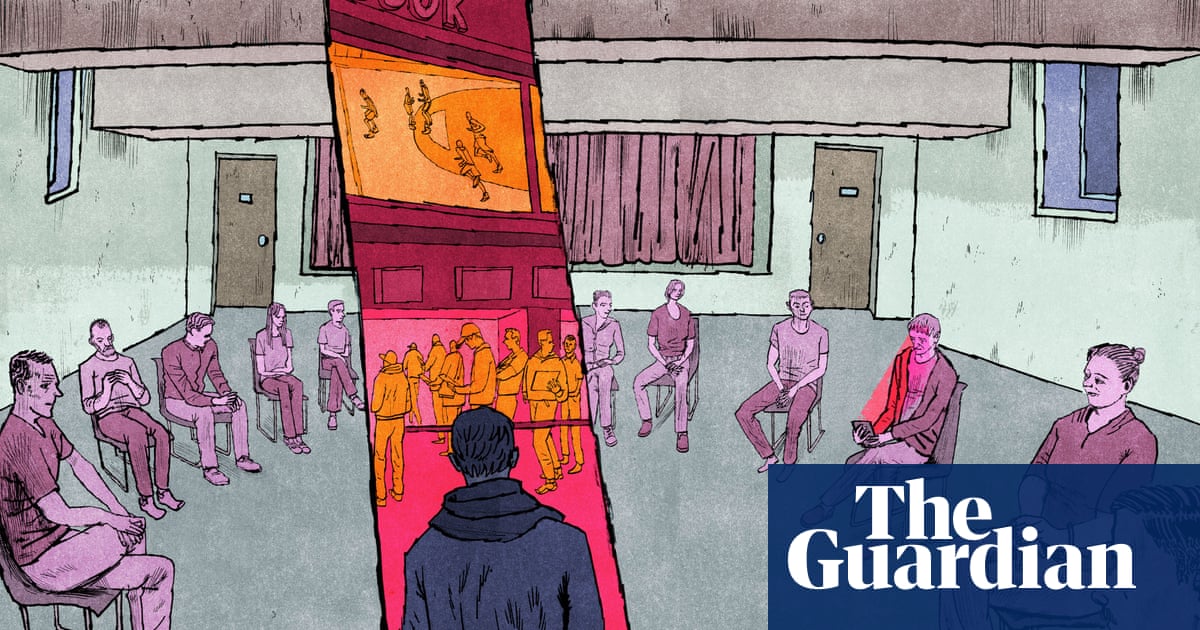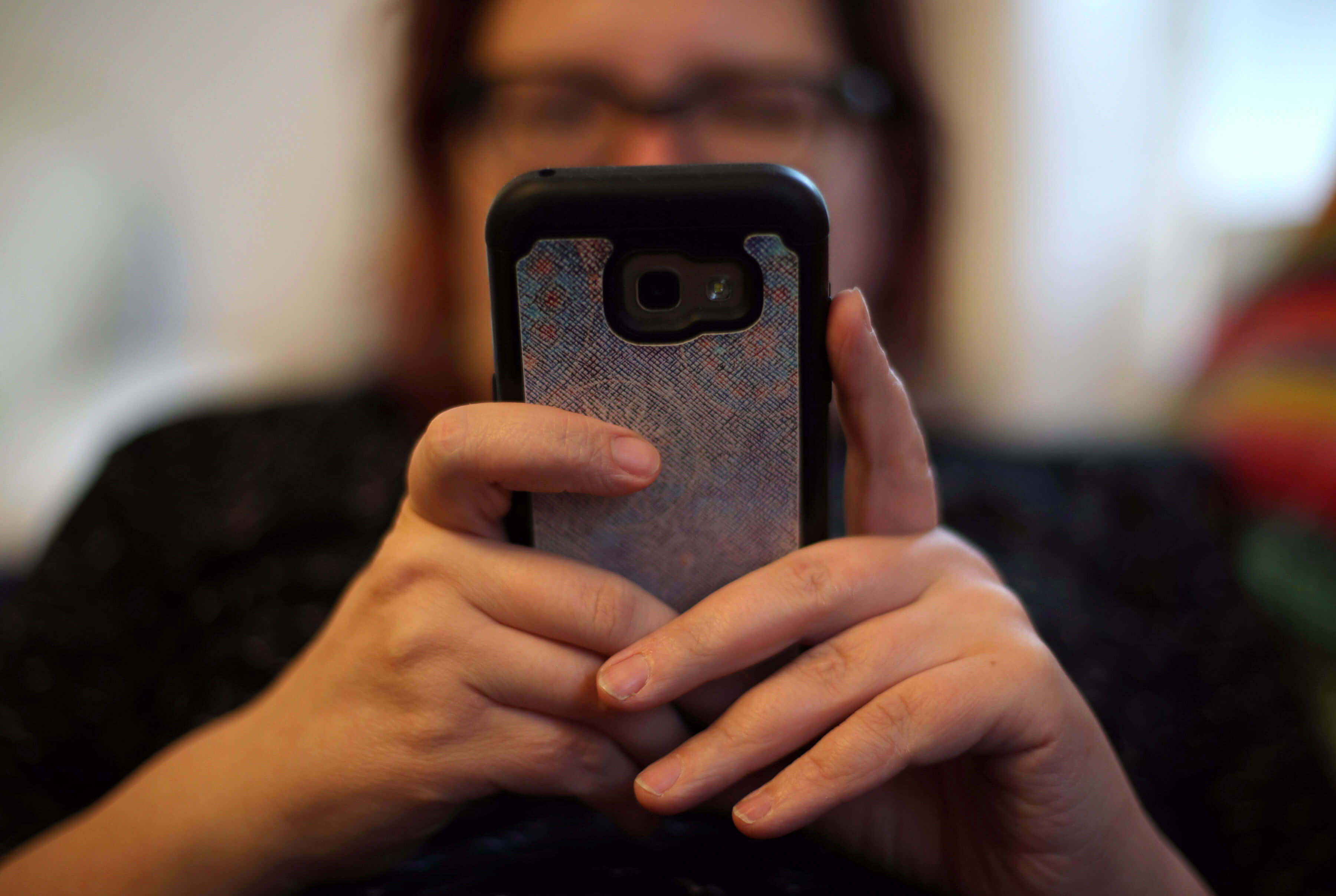‘At war with myself’: with gambling on the rise in the US, young addicts seek solace in an old program

Each man enters the room, one by one, escaping the dark night outside. Before long some two dozen are sitting in a horseshoe. They hail from different worlds and different generations, but have been united by the same problem.
For decades, Gamblers Anonymous (GA) has offered compulsive gamblers a place to share their stories, and listen to others, in the hope of turning their lives around. Veterans of the 12-step program say it is now experiencing a sharp rise in interest from troubled young addicts.
“It’s getting worse,” according to Bruce, who went to his first meeting in 1971. Gambling firms make it look “glamorous”, he said. “They make it seductive. And young people, they just get sucked in.”
While data on compulsive gambling rates is sparse, the few signals are flashing red. Helpline traffic has risen sharply in some states. The risk of gambling addiction in the general population increased by 30% between 2018 and 2021, according to research by the National Council on Problem Gambling, which estimates that seven million adults in the US are now affected by the disorder.
With limited options, a significant number – overwhelmed and underserved – find themselves walking down a staircase into a church basement, and pulling up a chair. As online gambling continues to boom, these meetings take place each week in towns and cities right across the country.
The Guardian was invited to attend GA by members. The names of those present have been changed.
Two moderators lead the meeting from the middle of the horseshoe. One of them glances up, calling on Adam.
‘I was obsessing’
“Hi, I’m Adam, and I’m a compulsive gambler,” he says. “Hi Adam,” the room replies. It’s been 65 days since his last bet, he reveals, to a round of applause.
“When I get something in my mind, it just never leaves my mind until I actually do it,” Adam tells the room. A few weeks ago, he was grappling with this reality when staring at a poker game on his phone.
“I was obsessing and watching it on the app for hours,” he recalls. Now, he sees it as a “waste of time: not good, not healthy”, but then? He didn’t need to take the other men in the room through the thoughts which had swirled around his head.
“I’m just glad to be here,” adds Adam. “When I’m alone and just to myself, in my thoughts, it’s a dangerous place.”
Wrapping up his contribution, he reaches for a common refrain at GA meetings: “I’ll be back,” he assures the room, prompting a ripple of applause. It fades, allowing one of the moderators to offer some advice. “You’ve got to keep busy,” he says.
Twenty hours a day
“Hi, I’m Ben, and I’m a compulsive gambler,” he says. “Hey Ben,” the room replies.
Work, video games, nicotine and chess are among the things Ben has been addicted to over the course of his life. None of it compared to his relationship with gambling. “I was really, really addicted and obsessing,” he explains.
Ben reckons he used to spend at least half his waking hours betting: maybe “80 or 90 hours” some weeks. “Kinda scary,” he says, recalling days when all he had wanted to do was sit in his room, vaping and gambling “for like 20 hours” at a time.
All this took its toll. “I really do think I would have been fired right now if I hadn’t come to meetings,” says Ben. It’s been 154 days since his last bet.
He’s come a long way, but the more experienced hands in the room know the climb ahead will be steep. “One thing a time,” cautions one of the moderators.
‘Compulsive gamblers lose’
“Hi, I’m Calvin, and I’m a compulsive gambler,” he says. “Hi Calvin,” the room replies.
Calvin has been making progress. Recently he has enjoyed the novelty of walking around with enough money for a burger, fries and a drink again; another step forward.
But a few days ago, during a sports game, “I had the urge to play.”
To overcome it, he did something that GA members are encouraged to do often: pick up the phone and speak to other people in the program. His gambling compulsion faded during the calls, and before long he headed out swimming. Another day clean.
By the weekend, however, the urge was back, courtesy of an Ultimate Fighting Championship match. UFC “was another thing that was big for me”, Calvin tells the room. He grabbed his phone, but rather than placing a wager, he again spoke to others in the program. One call went on for an hour. Another day clean.
While relieved, the fear of what could have been lingers. “The thing that hit me the most was the ‘what if?’ I would probably have lost $500 or $600 that night,” he says, trailing off. “That’s about it.”
The room applauds. “Keep on doing what you’re doing,” says the first moderator. “It’s not good to check the scores.”
“Compulsive gamblers lose,” adds the second.
‘Compulsion drives my entire life’
“Hi, I’m Dylan, and I’m a compulsive gambler,” he says. “Hey Dylan,” the room replies.
“Compulsion just drives my entire life,” he says. Whether it’s drinking, eating, sleeping or smoking, Dylan’s “initial instinct” is to do “bad shit”.
He stops, thanking the room, and gets a round of applause – before remembering another thing he wanted to talk about. It’s been seven months since his last bet, but the other week something came up at work. “Some asshole” started talking about the New York Rangers, and how great they were doing, sending him “into a tailspin”. Hockey used to be his thing.
Dylan managed to steer clear. For him, any return to sports betting would not be brief. The first wager would be a step off the top of a steep slope. “Yeah, I would have won those hockey games,” he says, “but I would’ve lost it on Indonesian ping pong”.
The room sits in silent agreement. “I’m constantly at war with myself over that stuff.”
‘I lost $3,000 in a day’
“Hi, I’m Eddie, and I’m a compulsive gambler,” he says. “Hi Eddie,” the room replies.
This isn’t Eddie’s first time in Gamblers Anonymous. It’s not his first time at this meeting, either. But it is the first time, this time, that he’s seeking help.
Six days have passed since Eddie placed his last bet. “I was here three months ago, but went back to gambling,” he says. “Sports betting.”
He had tried to stop, using self-exclusion tools in an attempt to block himself from using the big platforms. After a while, though, he returned to betting by using friends’ accounts.
Things quickly spiraled. “I had about $3,000 on me and lost it all in a day,” Eddie recalls.
A recent cab ride had persuaded him to come back to GA. The driver had encouraged him; it had worked for their dad. “I gotta get back to these meetings,” says Eddie, glancing around. “So I can be like all you guys, I guess.”
This was a beginners’ meeting, a first stage at some of the larger GA groups. Those who go a year without gambling graduate to its main gathering, known as the big meeting.
Three years ago, this particular beginners’ group consisted of “two, maybe three, people” each week, according to one of the moderators. Numbers have jumped markedly over the past year and a half. “Now it’s 25.”
Twelve months is a painfully long time on the road to recovery. There are many highs and lows between each of GA’s 12 steps. Attendees are expected to commit to the process, put in the time for meetings and calls, and build connections with others in the program.
Many who show up for the beginners’ meeting are unlikely to make it through to the main meeting. As with many recovery programs, relapse is common.
But those who have persevered insist that commitment to GA – turning up to meetings, week after week, and making calls, day after day – yields results.
“There is life after gambling, and it’s a good life,” said Bruce, after the meeting. “If you think about it, if 30 people get up and say that their lives are getting better because of abstinence,” it has an impact.
“There’s hope,” he added. “You see that it can be done.”
-
Find out more about Gamblers Anonymous at gamblersanonymous.org.
-
In the US, call the National Council on Problem Gambling at 800-GAMBLER or text 800GAM. In the UK, support for problem gambling can be found via the NHS National Problem Gambling Clinic on 020 7381 7722, or GamCare on 0808 8020 133. In Australia, Gambling Help Online is available on 1800 858 858 and the National Debt Helpline is at 1800 007 007.
Related
Sports Betting Giant Flutter Forecasts Strong U.S. Growth To Drive…
Flutter CEO Peter Jackson.Courtesy of Flutter Entertainment Flutter Entertainment, the world’s largest online gambling company, said that it’s expecting str
BetBlocker Enters US Responsible Gambling Market
The charity, originally from the UK, launched a US unit, BetBlocker US, as part of its North American entry. The organiz
Viewers react to ’embarrassing’ JD Vance comment toward Zelenskyy as…
Social media users watching clips of the heated meeting between President Donald Trump, Vice President JD Vance and President Volodymyr Zelenskyy have called a
Ukraine latest: Zelensky urges Trump to stand ‘more firmly on…
We have Zelensky's statement in full Below, we have Ukrainian president Volodymyr Zelensky’s statement in full after touching down in the UK following a fiery













